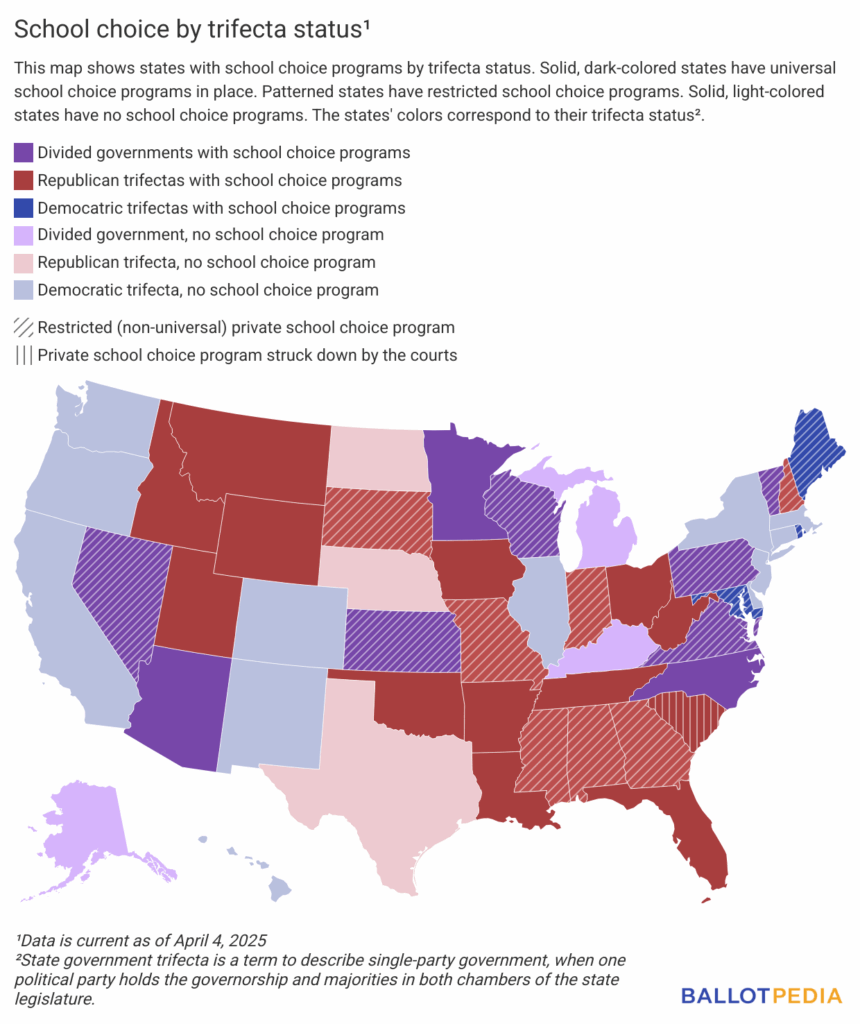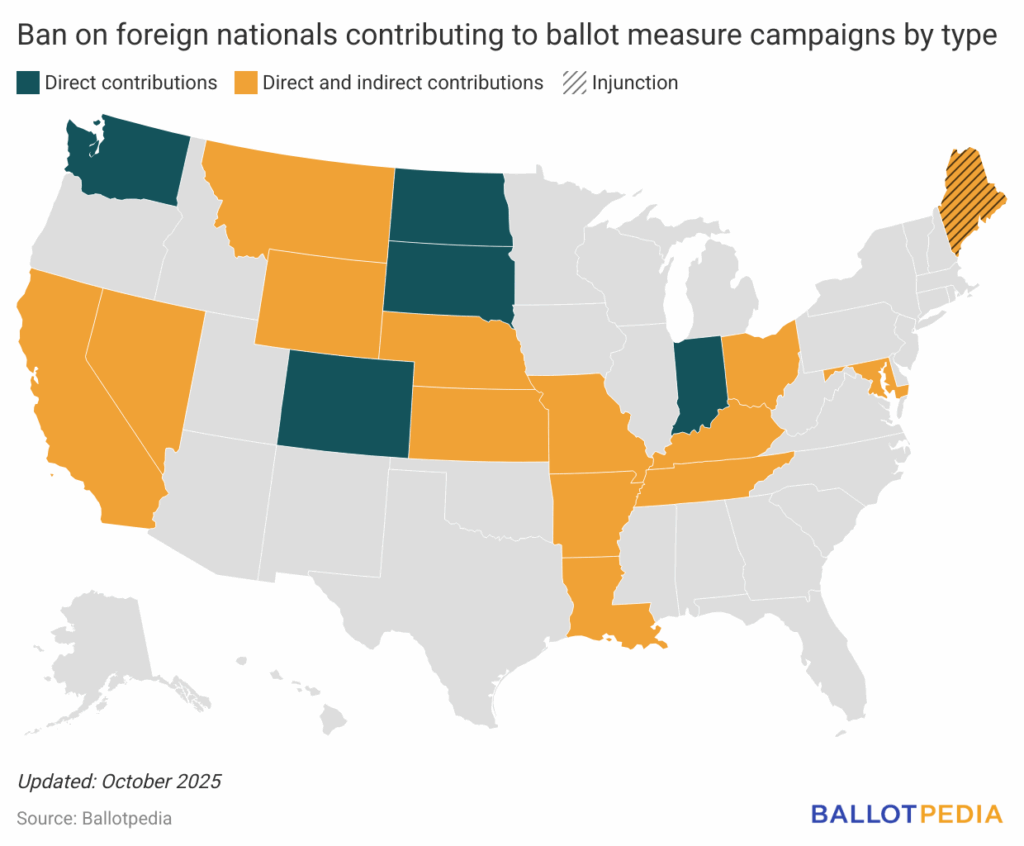Welcome to the Monday, Oct. 13, Brew.
By: Briana Ryan
Here’s what’s in store for you as you start your day:
- Nebraska becomes the first state to elect to participate in the federal private school choice program
- California enacts four laws on ballot measures and recall elections this year
- After a tied appointment vote, two candidates are running in the special election for Plumas Unified School Board District 5
Nebraska becomes the first state to elect to participate in the federal private school choice program
On Sept. 29, Nebraska Gov. Jim Pillen (R) issued an executive order directing state agencies to prepare for participation in the nation's first federal school choice tax credit program, which will take effect on Jan. 1, 2027. Pillen's order makes Nebraska the first state to opt into the program.
The program was part of the federal budget reconciliation bill—the One Big Beautiful Bill Act—that President Donald Trump (R) signed on July 4. When the credit takes effect, people will be able to write off, or subtract, up to $1,700 from the amount of federal taxes they owe if they donate to approved scholarship organizations that help students pay for school. These Scholarship Granting Organizations (SGOs) will then distribute the funding to eligible students for K-12 educational expenses, including tutoring, public school extracurricular programs, and private school tuition.
The scholarships would be available to families making up to 300% of the region's median income. States must opt in to participate in the program, though donors in states that do not join the program can still send money to SGOs in other parts of the country. Participating states must submit an annual list of designated SGOs to the U.S. Treasury.
Before the program can take effect, the U.S. Treasury will use the rulemaking process to develop and issue regulations governing its implementation, including eligibility requirements and oversight procedures.
Although this is the first federal program providing eligible students with government funding for private K-12 expenses, 34 states have adopted school choice policies. Those include vouchers, education savings accounts (ESAs), and tax-credit scholarships.

According to EdChoice, an organization that advocates for private school choice programs, approximately one million students participated in a private school choice program at the end of 2024. That's approximately 2% of the total K-12 public school student population.
Currently, 16 states do not have any private school choice programs. That includes Nebraska, but for a short time, that wasn't the case.
In April 2024, Pillen signed LB 1402, which sought to appropriate $10 million in state funds for private school scholarships to qualifying schools and students beginning in the 2024-2025 school year. On Nov. 5, 2024, Nebraska voters decided 57% to 43% to repeal the law.
Although Nebraska was the first state to join the federal school choice tax credit program, Republican lawmakers in North Carolina unsuccessfully attempted to claim that spot over the summer when they passed HB 87. On Aug. 6, Gov. Josh Stein (D) vetoed the bill. However, Stein said he intended to opt the state into the program if the U.S. Treasury clarifies that states can restrict the scholarships to public school students to defray the costs of after-school programs and tutoring.
The North Carolina General Assembly could vote to override Stein's veto. On Sept. 19, six Republican members of North Carolina's U.S. House delegation sent a letter to state House Speaker Destin Hall (R) and state Senate Pro Tempore Phil Berger (R) asking them to override Stein's veto.
A veto override in North Carolina requires 72 votes in the state House and 30 in the state Senate. Republicans currently have a 70-49 majority with one vacancy in the state House, and a 30-20 majority in the state Senate. That means if all Republicans vote in favor of the override in the state House, they would still need two Democrats to join them to override the veto.
Other governors have also weighed in on the program:
- The Democratic governors of New Mexico, Oregon, and Wisconsin have all said their states will not participate in the program.
- The Republican governor of Tennessee said the state would participate in the program.
- Virginia Gov. Glenn Youngkin (R) said he wanted to see the state opt in, but would need to wait until the U.S. Treasury releases more guidance before committing the state one way or the other.
A version of this story appeared in our Hall Pass newsletter on Oct. 8. Hall Pass covers the conversations driving school board politics and education policy. Click here to sign up.
Click here for more information on state participation in the federal school choice tax credit program.
California enacts four laws on ballot measures and recall elections this year
This year, California has enacted four bills that make changes to the laws governing ballot measures and recall elections in the state, including a bill to prohibit foreign nationals from contributing to state and local ballot measure campaigns.
AB 953 defines foreign nationals as "a person who is not a citizen of the United States and who is not a lawfully admitted permanent resident" and exempts persons granted deferred action under the Deferred Action for Childhood Arrivals (DACA) program from this definition, which is a unique provision from the other states that prohibit foreign nationals from contributing. California law already prohibited foreign governments and foreign principals from contributing to ballot measure campaigns.
Nineteen states have enacted laws banning foreign nationals or governments from contributing to ballot measure campaigns. Six states have enacted bans on direct contributions, while 13 states have banned direct and indirect contributions from foreign individuals or entities.

Gov. Gavin Newsom (D) signed the bill on Oct. 2 after both legislative chambers passed it unanimously. The other three bills enacted this year also received unanimous support from all voting legislators:
- AB 94 prohibits local officers removed by a recall election from being appointed to fill the newly vacant position.
- AB 1512 standardizes how local ballot measures appear on ballots by requiring "Yes" and "No" to appear on separate lines following the ballot question and vote threshold requirement.
- AB 1513 made changes to election procedures, including requiring requests for candidate and ballot measure recounts to be filed with the Secretary of State within five days of the official canvass.
On Oct. 1, Newsom vetoed AB 699. The bill would have allowed local governments to replace tax rate or bond repayment information on the ballot label with a statement directing voters to the county voter information guide for those details. AB 699 passed largely along party lines, with Democrats supporting the change and all Republicans opposing it.
As of Sept. 23, 78 bills had been enacted into law across 24 states this year. Since 2018, the California Legislature has enacted 27 bills related to the laws governing ballot measures.
Click here to read more information about changes this year to laws regulating ballot measures.
After a tied appointment vote, two candidates are running in the special election for Plumas Unified School Board District 5
After a vote between members of the Plumas Unified School Board to fill a vacancy in District 5 resulted in a tie, Keith Barnett and Matthew De La Montanya are running in a nonpartisan special election on Nov. 4.
Incumbent Leslie Edlund resigned from the board on April 2. As a result, the board decided to pick a successor to serve the remainder of Edlund's term, which expires in December 2026. Barnett and De La Montanya were the only two candidates to apply for the seat.
On May 12, the board voted 2-1 in favor of Barnett, but under state law, the vote was invalid due to the absence of one member. On May 14, the board reconvened with all members and split 2-2 on who to appoint.
Subsequently, Plumas County Office of Education Superintendent Andrea Ceresola-White asked the district's superintendent, Jim Frost, about the next steps. Frost suggested that either White make an appointment or that she call a special election. On June 2, White called for a special election, which the board approved on June 18.
Barnett is the owner of a construction business. During the initial appointment votes, board members Cindy Crim and Chelsea Harrison voted for Barnett.
De La Montanya is a California Highway Patrol officer. During the initial appointment votes, board members Jolene Cline and JoDee Johnson voted for De La Montanya, and he received support from Leslie Edlund.
The board voted in April to request $20 million in state funds to address a budget shortfall. Both candidates have discussed how to handle the issue during the campaign:
- Barnett said the board "need[s] to reflect on past mistakes, take decisive steps to address the financial crisis, and create a team capable of recognizing warning signs before they become emergencies."
- De La Montanya said the board needs to improve communication and teamwork, saying, "I understand the state offers various training for the board members. As a board we need to take advantage of this! I will help build a team with the other board members so that we can make better decisions in the future."
Ten schools are part of the Plumas Unified School District, located in Plumas County. During the 2024 school year, 1,687 students attended one of the district's 10 schools.
Click here to read more about this special election.

